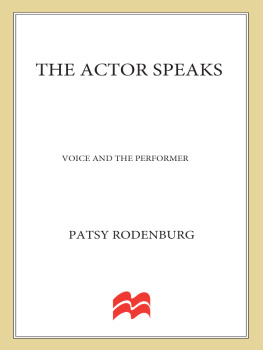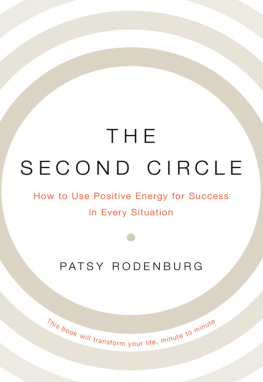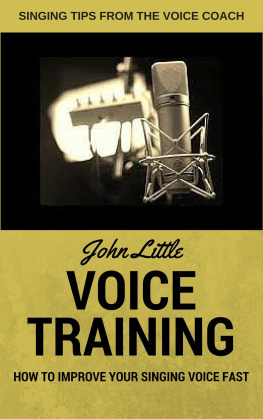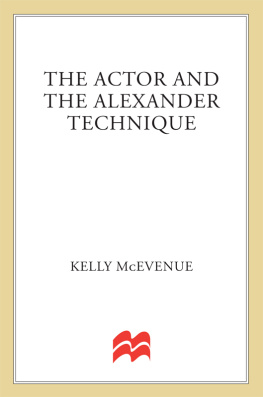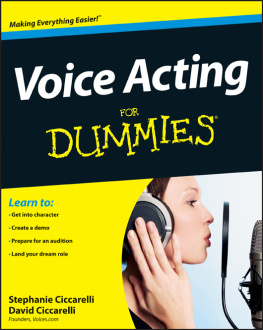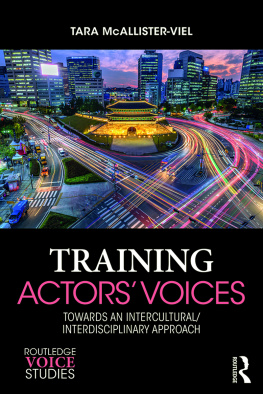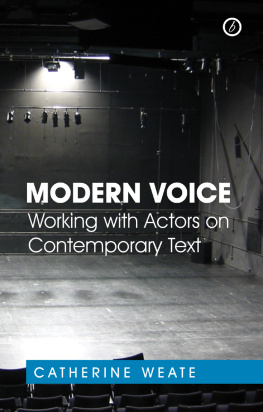Contents
Guide
Also by Patsy Rodenburg
The Right to Speak: Working with the Voice
The Need for Words: Voice and the Text
Audio cassette
The Right to Speak (Reed Audio)
Video tape
A Voice of Your Own (Vanguard Productions)
The Actor Speaks
Voice and the Performer
PATSY RODENBURG

The author and publisher have provided this e-book to you for your personal use only. You may not make this e-book publicly available in any way. Copyright infringement is against the law. If you believe the copy of this e-book you are reading infringes on the authors copyright, please notify the publisher at: http://us.macmillanusa.com/piracy.
To A.F.
with much love
True ease in writing comes from art, not chance,
As those move easiest who have learned to dance.
Alexander Pope
Praise for Patsy Rodenburg
Patsy was absolutely invaluable to my beginning to take on the awesome task of playing King Lear. Having been away from the stage for so long, it was vital to have someone who really knew what they were talking about and in whom I could put my trust. She is a great teacher and I think it absolutely fair to say I could not have played the King without her.
Ian Holm, 1997 Olivier Award for Best Actor
Working with Patsy is a unique experience. She gives you a wondrously simple way of releasing the voice and the body which also becomes a way of life.
Anna Massey, Actress
Patsys work has been a source of inspiration to countless actors. This book shares her years of experience in the theatre in an immediately accessible way.
Joan Washington, Dialect Coach
Like athletes and dancers, actors need to warm-up before appearing in public. Patsys classes during a demanding play like The Madness of King George were invaluable. And her books are a wonderful top-up.
Nigel Hawthorne, Actor
Patsy Rodenburgs work is holistic a free voice, a free body and a free flow of emotion are intimately connected. She totally reinforces whatever I am trying to achieve and in many cases she is the one who creates break-throughs for the actors with her perceptive and sympathetic skills.
Mike Alfreds, Director
Patsy Rodenburgs work is not merely concerned with connecting actors with their voices, but in connecting their heads to their hearts. This is an indispensable handbook for actors who are serious about their craft. When Patsy speaks actors should listen, so that when actors get to speak, we all listen.
John Caird, Director
Patsy doesnt just teach voice. She has a very free and open approach in guiding you to find your own voice and not one which is remotely imposed. She has the great gift of making it seem easy.
Geraldine McEwan, Actress
The great thing about working with Patsy Rodenburg is that she takes the mystery out of speaking in the theatre. She makes it simple and thats her great gift.
Richard Wilson, Actor
Struggling with a rehearsal of a platform on the Olivier stage, a reassuring voice called out from the daunting auditorium. I was soon reminded why Patsy is such a unique, dynamic guide in getting us back to the vocal pathway of instinctive expression by undoing all the habitual blockages of our daily conditioning. Patsy and the way of the voice are inseparable.
Joseph Fiennes, Actor
Patsy Rodenburgs guidance and the clarity and directness of her approach have been invaluable to me.
Ralph Fiennes, Actor
What leaves actors tongue-tied for years, Patsy releases in minutes. Not as a result of a mystical process, but through simple, practical actions that can empower anyone whatever their background or nationality with the pleasure and ability to possess and communicate through language. And, more importantly, the ability to speak it in their way.
Simon McBurney, Actor and Director, Theatre de Complicite
When I went to the Central School of Speech and Drama in 1954, I thought I knew the sort of thing I was expecting lots of work in relaxation, a bit of breathing, some movement, a few voice exercises, and lots and lots of acting. Not many weeks had passed before I realised that the most important thing was first, the relaxation, then the breathing and then the voice. The voice training I received at Central from Cecily Berry and Clifford Turner laid the groundwork for what was to become a way of life.
After many years in this profession, I find that there is a tendency to come to a play thinking, this is one that I will be able to manage with comparatively little trouble. You dont foresee any problems and you hurry confidently into rehearsals. This scenario, in fact, has never proved to be the case for me because always, in every play, there is a different kind of problem that you havent had to deal with before and, in most instances, it will concern the voice. In Hugh Whitemores play, Pack of Lies, for instance, I was playing a very ordinary Ruislip housewife. I found it difficult to project not only the characters voice, but also her emotions, to the back of the theatre. I found I longed to come walking down the stairs and bellow My Lord of Buckingham ! The answer lies in Patsys book. Back you come each time to your technique and you find that there are ways of projecting your voice in any circumstance.
I have always maintained that the difference between an amateur and a professional is that the amateur only has to sustain a performance for a week during a year. The professional, if he is lucky, has to sustain it for much longer and this relies completely on the voice and the use of the voice.
I never met Patsy Rodenburg at Central because we were there at different times, but I met her later at the National Theatre. I can honestly say that it is thanks to Patsy that, when I have been in trouble with my voice, she has been able to reassure me and give me some exercises which have enabled me to go on that night but, more importantly, for the rest of the run.
I am not a natural singer (!), and when I was cast as Desiree Arnfeldt in A Little Night Music at the National Theatre, I told Patsy that I was worried about sustaining my voice during the scene where I sang Send In The Clowns. The scene was set in my bedroom and all I had by way of a set was a rose-covered bed, on which I had to sit to sing the number. This was all I had to hang on to. Patsy explained that if I pushed down on the bed with my hands, it would raise the diaphragm, which would enable me to breathe properly and the voice would take care of itself. This is exactly what happened and, in fact, Patsy arranged for the bed to be made harder so that it was easier for me to push down on it.
It is essential to warm up your voice before a performance and the best thing you can possibly have is a class with Patsy. This is the way I have felt most confident about going on. By doing exercises, it is one way of getting rid of nerves, or at least utilising them, so that you have something really positive to think about and concentrate on while getting ready to go on. If you cannot have Patsy in person, then her book is the next best thing.
All the great performances I have seen have nearly always come down to the actor and his voice. All the training in the world will not help if the basic training on the voice has not been done. Patsy Rodenburgs book is a Bible. Having read it, I would now feel insecure without it. Even opening it and reading at random whets your appetite to read further and learn more about the voice. I intend to keep it by me at all times a security blanket which I know will never let me down.

